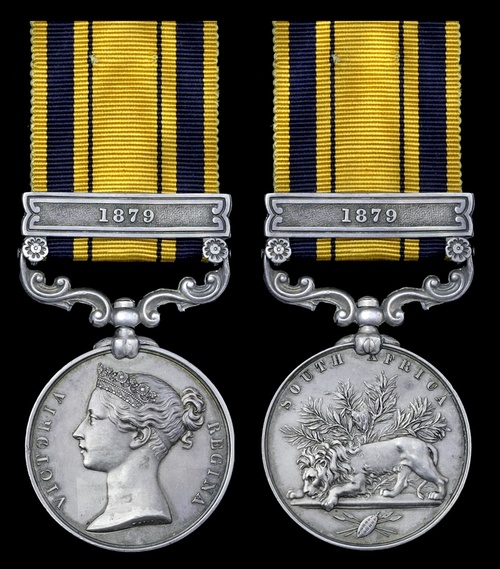
Auction: 19002 - Orders, Decorations and Medals
Lot: 34
A notable South Africa Medal awarded to Surgeon Lieutenant-Colonel J. McGann, Army Medal Department, who served at Rorke's Drift and Helpmakaar in January 1879, where he operated on an assegai wound suffered by Corporal J. H. Mayer, 3rd Native Regiment
McGann remained in the Cape for the First Boer War and received a brace of 'mentions', the second for his fine 'indefatigable' work under fire when sole Medical Officer in the action at Ingogo River
South Africa 1877-79, 1 clasp, 1879 (Surgn. J. McGann. A. M. Dept.), good very fine
M.I.D. London Gazette 10 March 1881 (Laing's Nek):
'Surgeons E. King and J. McGann, A.M.D., and Surgeon E. E. Mahon, R.N., distinguished themselves by their attention to the wounded under fire.'
M.I.D. London Gazette 29 March 1881 (Ingogo River):
'Surgeon McGann well maintained the distinguished reputation of the Medical Department for self-sacrificing exposure in attendance of the wounded. Until the arrival of the ambulances, with Surgeons Ring and Landon, he was the only Medical officer with the Force and laboured indefatigably with wounded.'
James McGann was born at Carron, County Clare on 28 July 1851 and was appointed Surgeon on 30 September 1874. Having landed in South Africa on 13 December 1878, McGann was swiftly employed in the field. His exact whereabouts at the time of the epic defence remain unknown, but he was certainly at the hospital between 23-31 January, for the entry 'Dr. McGann arrived from Rorke's Drift' is entered in the diary of Dr. L. W. Reynolds who was at Helpmakaar at that time (The Diary of a Civil Surgeon serving with the British Army in South Africa during the Zulu War, refers).
McGann would also be noted by Dr. B. Brown for his work assisting in an operation at Helpmakaar, having arrived back there at the end of January. Surgical Notes on the Zulu War takes up the story:
'Assegai wound of left hand. Private J. H. M., [Corporal Jessy H. Mayer] 1st Battalion 3rd Regiment Native Contingent, present on the 12th January at the attack on Sirayo's Kraal. Several prisoners taken, one of them being irritated by our friendly Kaffirs, tried to force his escape, and assegai in hand, stabbed left and right at everyone...the patient thus injured. A bandage was applied and he was conveyed to Rorke's Drift for treatment. On the 26th January he was sent to Helpmakaar...no further bleeding took place for two days, when it burst forth again.
Assisted by Surgeon McGann and Civil Surgeon Beresford, the patient being under the influence of chloroform, I enlarged the wound to look for blood vessels...The wound healed rapidly, on the 15th February he left Helpmakaar for Ladysmith. He is now at his duty in a mounted corps at the front, none the worse for his wound.
This patient was one of those in the hospital at Rorke's Drift on the memorable 22nd of January and managed to hop out from the one building, under fire, to the other. He therefore had four marvellous escapes within a few days; the first that of the stab at Sirayo's Kraal; secondly the escape under fire from the hospital at Rorke's Drift; thirdly the frequent profuse haemorrhages; and fourthly the operation.'
McGann was busy in the period which followed, with wounded requiring constant treatment and movement. He left for Pretoria on 5 February, returning via Camp Mount Prospect, and took over the Medical Equipment at Helpmakaar on 15 February, before presiding as President over a board of Medical Officers to report on the sanitary conditions in the station.
Remaining in South Africa, he was also present for the Sekhunkhune, November 1879 and the First Boer War, 1880-81, displaying particular resolve at Ingogo River.
It was at Schuinshoogte, north of Newcastle on 9 February 1881 that the costly battle was fought. Under the command of Major-General Colley, the British forces engaged Smit's Republican forces at the crossing of the river. By the day's end, the allied forces suffered 69 killed and a further 77 wounded. The survivors of which were placed under McGann's care, having been carried from the field by approximately 9.30p.m.
McGann finished his time in South Africa with a brace of 'mentions' to go with his Medal & clasp. He left on 17 September 1881 and served at Fort Gomer, 1882-83, Malta, 1885-89, being advanced Surgeon Major in September 1886. Subsequently seeing service at Birr, 1891 and Dublin, 1892-95, and having been advanced Surgeon Lieutenant-Colonel in September 1894, he retired in September 1895. Employed in Dublin whilst on the Retired List, 1904-07, he died on 20 February 1929; sold with copied research.
Subject to 20% VAT on Buyer’s Premium. For more information please view Terms and Conditions for Buyers.
Sold for
£3,000
Starting price
£1000




